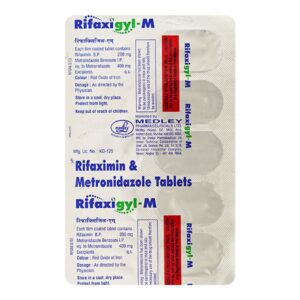METRONIDAZOLE + RIFAXIMIN
Metronidazole: Metronidazole is a prescription medication primarily used to treat a variety of infections caused by certain bacteria and parasites. It is an antibacterial and antiprotozoal agent that works by interfering with the DNA synthesis of the microorganisms, leading to their death.
Metronidazole is commonly prescribed for bacterial infections such as urinary tract infections, dental infections, and certain types of diarrhea caused by bacteria. It is also effective against parasitic infections like amoebiasis and trichomoniasis. In addition, it is sometimes used in combination with other medications to treat certain types of stomach ulcers caused by Helicobacter pylori bacteria.
The dosage of metronidazole will vary depending on the condition being treated and the individual’s response to the medication. It can be taken orally in the form of tablets or capsules, or it can be administered intravenously for more severe infections. The medication is usually taken with food to minimize potential stomach upset.
As with any medication, metronidazole can have side effects. The most common side effects include nausea, vomiting, loss of appetite, and a metallic taste in the mouth. Other potential side effects include diarrhea, headache, dizziness, and skin rashes. In some cases, metronidazole may cause a condition called peripheral neuropathy, which can result in tingling or numbness in the extremities.
It’s vital to take the full course of metronidazole as prescribed by the healthcare professional, even if symptoms improve before completing the medication. Skipping doses or stopping the medication prematurely can lead to incomplete treatment and potential recurrence of the infection.
It is important to inform your healthcare provider about any existing medical conditions or medications you are taking before starting metronidazole, as it can interact with certain drugs and medical conditions. Pregnant women should use metronidazole with caution, and it is typically not recommended during the first trimester.
Overall, metronidazole is an effective medication for treating various bacterial and parasitic infections. However, it is essential to take it as directed by a healthcare professional and be aware of potential side effects.
Rifaximin: Rifaximin is an antibiotic drug primarily used to treat various gastrointestinal infections. It is commonly prescribed for the treatment of traveler’s diarrhea caused by E. coli and for reducing the risk of hepatic encephalopathy recurrence in patients with liver disease.
The mechanism of action of Rifaximin involves inhibiting bacterial RNA synthesis by binding to the beta subunit of bacterial DNA-dependent RNA polymerase. This prevents the transcription of RNA and subsequently inhibits bacterial growth and replication.
The usual recommended dose of Rifaximin for traveler’s diarrhea is 200 mg three times a day for three days. For hepatic encephalopathy, the typical dose is 550 mg twice a day. However, the specific dosing and duration may vary depending on the individual and the condition being treated, so it is essential to follow the prescribing doctor’s instructions.
Like any medication, Rifaximin may cause side effects. The most common side effects include bloating, gas, stomach pain, and an increase in bowel movement frequency. These side effects are generally mild and go away on their own. Less common but more severe side effects may include severe allergic reactions, liver toxicity, and Clostridium difficile infection. If any concerning side effects occur, it is crucial to seek medical attention promptly.
It is important to note that Rifaximin is not effective against all types of infections, particularly those caused by viruses. It should only be used as prescribed by a healthcare professional for the specific condition it is intended to treat.

